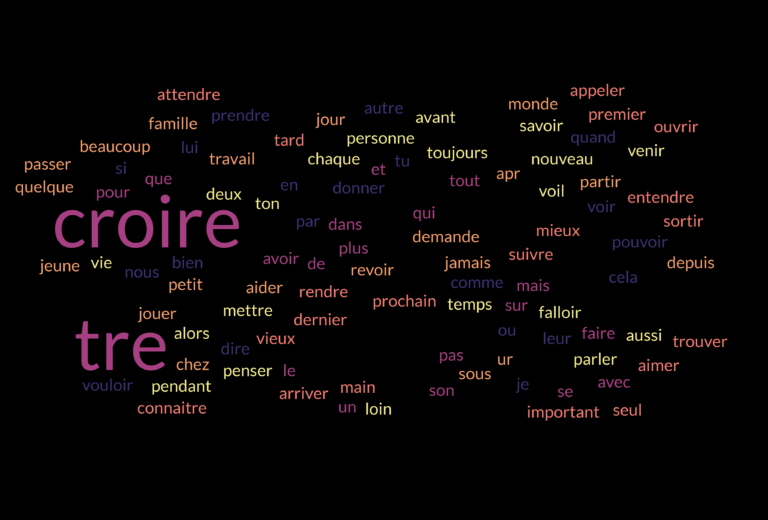Your Complete Guide to The French Plural

One of the first challenges French learners face is understanding how to form plurals, a seemingly simple concept that quickly gets complicated. There are straightforward rules like adding an “s” to nouns, but there are also some irregular patterns and exceptions.
Here are the essentials of forming the French plural, including irregular cases and some quirky words that only exist in the plural.
Download: This blog post is available as a convenient and portable PDF that you can take anywhere. Click here to get a copy. (Download)
Forming the Plural in French
Just add “s” to the noun (and change the article)
Generally, the plural of French nouns and adjectives is formed by simply adding an “s” at the end. Just like in English! The definite articles le , la and l’ (the) become les (the) in the plural. The indefinite articles un and une (a) become des (some) in the plural.
Let’s take a look at some examples with French nouns:
| French Singular Form | French Plural Form |
|---|---|
| Le stylo (the pen) | Les stylos (the pens) |
| La table (the table) | Les tables (the tables) |
Now let’s take a look at some examples in which French nouns are being modified by adjectives:
| French Singular Form | French Plural Form |
|---|---|
| Le stylo rouge (the red pen) | Les stylos rouges (the red pens) |
| La table ronde (the round table) | Les tables rondes (the round tables) |
One more thing: An “s” must be added to both the noun and the adjective. Agreement: a fact of French life.
How to pronounce that “s”
Spelling, and therefore pronunciation (and therefore reading aloud), can be tricky in French. For the most part, the little “s” we add at the end of nouns and adjectives is not pronounced, as is often the case with final consonants. There are, however, some exceptions in which it is pronounced.
When you see a plural adjective followed by a noun beginning with a vowel, the final “s” of the adjective is pronounced like a “z.”
- les grands éléphants (the big elephants)
- les jeunes athlètes (the young athletes)
When you come across a plural noun followed by a plural adjective that begins with a vowel, you can pronounce the noun’s final “s” as though it were a “z.”
- les chiens agiles (the agile/graceful dogs).
When things already end in “s” (or “x”)
I know what you’re thinking. What about words that already end in “s”? Don’t worry, I’ve got you covered.
When you come across a word that ends in “s,” its plural form is the same as its singular form. How’s that for a good deal?
The adjective gros (fat, big, large) is a case in point:
| French Singular Form | French Plural Form |
|---|---|
| Le gros camion (the big truck) | Les gros camions (the big trucks) |
One more thing: The definite article le still becomes les. Also, don’t forget the “s” at the end of camion !
The same deal applies when dealing with a French noun or adjective ending in “x.”
| French Singular Form | French Plural Form |
|---|---|
| La voix (the voice) | Les voix (the voices) |
| L'homme jaloux (the jealous man) | Les hommes jaloux (the jealous men) |
One more thing: In terms of pronunciation, the “x” and “s” endings function in the same way.
Forming the Plural in Irregular Cases
You probably saw it coming: There are many cases in which just adding an “s” to nouns and adjectives is not enough to form the plural. Sometimes, you’ve got to do a bit more. Luckily, there are some general rules that apply, depending on the endings of the nouns and adjectives.
Nouns and adjectives ending in “-al”
When there’s a masculine singular noun or adjective ending in “-al,” its plural form usually ends in “-aux.”
| French Singular Form | French Plural Form |
|---|---|
| Un journal (a newspaper) | Des journaux ([some] newspapers) |
| international (international) | internationaux (international) |
| Un journal international (an international newspaper) | Des journaux internationaux (international newspapers) |
One more thing: It’s important to note that this only applies to masculine cases. To use the feminine form of an adjective ending in “-al,” the change is regular and an “e” is added in the case of the singular, as in une revue internationale (an international magazine). For the plural we add an “s” to the noun and the adjective to get des revues internationales ([some] international magazines).
Exceptions: There are some notable exceptions whereby masculine singular nouns and adjectives ending in “-al” become plural by “regular” means, which is to say, we simply add an “s” to the ending.
- The plural of bal (ball, as in “masquerade ball,” dance) is bals (balls, dances).
- The plural of festival (festival) is festivals (festivals).
- The plural of banal (banal, ordinary) is banals .
- The plural of fatal (fatal, deadly) is fatals .
- The plural of final (final) is finals *
*Occasionally, you will see finaux (final) used, particularly in economic and financial contexts.
One more thing: The masculine noun mal (ache), when used in mal de tête (headache) becomes maux de tête (headaches) in the plural.
Nouns and adjectives ending in “-eau,” “-au” and “-eu”
The plural of singular nouns and adjectives ending in “-eau,” “-au” and “-eu” is most often formed by adding an “x” to the ending.
| French Singular Form | French Plural Form |
|---|---|
| Le château (the castle, the château) | Les châteaux (the castles, the châteaus) |
| Le plateau (the tray, the platter) | Les plateaux (the trays, the platters) |
| Le seau (the bucket) | Les seaux (the buckets) |
| Le jeu (the game) | Les jeux (the games) |
Exceptions: There are cases when we simply add an “s” to form the plural.
Nouns ending in “-ail”
Nouns that end in “-ail” in the singular generally end in “-ails” in the plural, but there are certain cases in which their endings are “-aux” in the plural.
| French Singular Form | French Plural Form |
|---|---|
| travail (work, job) | travaux (works, jobs) |
| vitrail (stained glass window) | vitraux (stained glass windows) |
| bail (lease) | baux (leases) |
French Words That Only Exist in the Plural
There are several nouns in French that only exist in the plural. They just can’t be alone! Here’s a list of some exclusively plural nouns that you’re bound to come across. It’s important to note that each of these nouns still has a gender that you should know for the sake of agreement.
| French | English |
|---|---|
| Les abats | giblets |
| Les alentours | neighborhood, surroundings |
| Les beaux-arts | fine arts |
| Les condoléances | condolences |
| Les coordonnées | coordinates, contact information |
| Les décombres | rubble |
| Les fiançailles | engagement |
| Les frais | expenses, charges |
| Les funérailles | funeral |
| Les gens | people |
| Les honoraires | fees |
| Les mathématiques | math |
| Les menottes | handcuffs |
| Les mœurs | morals, customs |
| Les obsèques | funeral |
| Les ordures | trash |
| Les représailles | reprisals, retaliation |
| Les ténèbres | darkness, gloom |
French Nouns That Change Meaning in the Plural Form
Some French nouns are just plain fickle! Their meanings change depending on whether they’re singular or plural. Here’s a list of some of the most common ones.
| French Singular Noun | Meaning | French Plural Noun | Meaning |
|---|---|---|---|
| Le ciseau | a chisel | Les ciseaux | a pair of scissors |
| Le comble | a height, a peak or the (figurative) last straw | Les combles | an attic |
| La douceur | softness or sweetness (both literal and figurative) | Les douceurs | desserts or sweet talk |
| L'eau | water in general (water in a swimming pool, drinking water, etc.) | Les eaux | the water of bodies of water: river/lake/sea water |
| L'humanité | humanity | Les humanités | the humanities (the field of academic inquiry) |
| Le lendemain | the next day | Les lendemains | consequences, or future prospects of something or someone |
| La mémoire
Le mémoire | the faculty or act of memory a master's thesis | Les mémoires | memoirs |
| L'ouïe | the (sense of) hearing | Les ouïes | gills (like those of a fish) |
| La pâte | dough (as in pizza dough) | Les pâtes | pasta |
| Le statut | a status (a social status, for example) | Les statuts | statutes (which are documented legal enactments) |
| La toilette | the overall process of getting ready (showering, brushing one's teeth, combing one's hair) or personal hygiene | Les toilettes | the restroom |
| La vacance | a vacancy | Les vacances | vacation |
How to Practice the French Plural
- Read. This may seem like a no-brainer because books, magazines and newspapers are chock-full of plural nouns and adjectives. The key, though, is reading actively. One thing you can do is, each time you come across the plural form of a word, convert it to the singular form and vice versa. If you’re in the mood to cozy up with a grammar book, I recommend “The Everything French Grammar Book: All the Rules You Need to Master Français” by Laura K. Lawless.
- Listen to French media. Listening to French media is a great way to see the plural form in use by native speakers. There are so many resources to choose from, such as French podcasts and movies, or you could try using a language learning program like FluentU.
FluentU takes authentic videos—like music videos, movie trailers, news and inspiring talks—and turns them into personalized language learning lessons.
You can try FluentU for free for 2 weeks. Check out the website or download the iOS app or Android app.
P.S. Click here to take advantage of our current sale! (Expires at the end of this month.)
Another great way to up your plural game is by using listening exercises like “spot the error” when watching or listening to French media. You see, it’s not uncommon for native French speakers to “mix up” the plural of irregular French nouns and adjectives. I highly recommend listening to interviews and talk radio shows to hunt for these little slips of the tongue.
- Transcribe and transform. Dictées (dictations) are another great way to get cozy with French plural nouns and adjectives. A simple yet effective activity is to transcribe a short piece of audio from a podcast and then transform it with the plural. Make sure to pay attention to pronouns and agreement!
- Quiz yourself. Flashcards, oldies but goodies, are a great way to get used to plural nouns and adjectives. Check out these flashcards and this quiz for starters.
So get cozy and get to it!
The more time spent, the more mots (words) in your head.
Before you know it, your plural game will be on point.
Download: This blog post is available as a convenient and portable PDF that you can take anywhere. Click here to get a copy. (Download)
And one more thing...
If you like learning French on your own time and from the comfort of your smart device, then I'd be remiss to not tell you about FluentU.
FluentU has a wide variety of great content, like interviews, documentary excerpts and web series, as you can see here:

FluentU brings native French videos with reach. With interactive captions, you can tap on any word to see an image, definition and useful examples.

For example, if you tap on the word "crois," you'll see this:

Practice and reinforce all the vocabulary you've learned in a given video with learn mode. Swipe left or right to see more examples for the word you’re learning, and play the mini-games found in our dynamic flashcards, like "fill in the blank."

All throughout, FluentU tracks the vocabulary that you’re learning and uses this information to give you a totally personalized experience. It gives you extra practice with difficult words—and reminds you when it’s time to review what you’ve learned.
Start using the FluentU website on your computer or tablet or, better yet, download the FluentU app from the iTunes or Google Play store. Click here to take advantage of our current sale! (Expires at the end of this month.)








